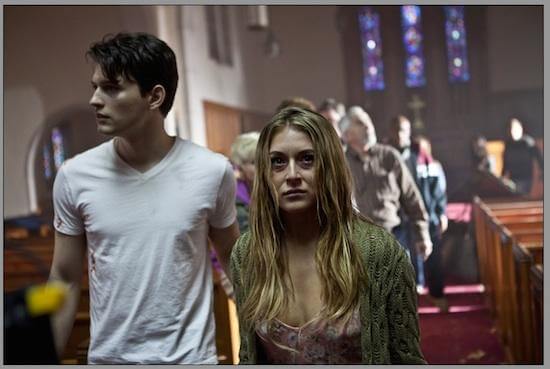
The Remaining, written and directed by Casey LaScala, takes the tropes of the modern horror movie (found footage, attractive young cast getting killed off one by one) and uses them to tell the story of the Rapture from the Book of Revelations. Except anyone who doesn't already know about the Rapture can watch the movie without getting tangled up in the details of a Bible story.
It's a bold experiment: will the expanding faith-based movie fan base embrace a movie that's inspired by a genre that most of them avoid at all costs? Will horror fans accept a PG-13 movie in a genre whose movies routinely push the boundaries of an R rating?
The movie opens at a wedding. Most of the guests drop dead and our young protagonists are left to piece together what happened. There are demons afoot and a lot of deaths in the aftermath of the Rapture. The cast's most recognizable face is Alex Vega, the girl from Spy Kids all grown up. The rest of the lead actors (Johnny Pacar, Italia Ricci, Shaun Sipos, Bryan Dechart) might be familiar to viewers of the CW or ABC family, but they're mostly young performers looking for their big Hollywood break.

The very brave man behind The Remaining is Casey LaScala, who previously directed the 2003 skateboarding movie Grind and has a long list of production credits including Donnie Darko, A Walk to Remember and What a Girl Wants. He talked to Military.com about what inspired him to make the film and the challenges he faced in his efforts to effectively launch a new genre.
I've been describing The Remaining as a faith-based horror movie.
That’s kind of how it started in the beginning stages during development I wondered if I could even do a faith-based horror movie. I didn’t know if there was actually a genre until I realized that The Passion of the Christ was kind of a faith-based horror movie. So I'm like, wait, if they can do it, they can take that story and do it, maybe there's a way of doing this kind of concept and getting viewers from the faith-based community but also reaches a mainstream audience as well.
So I think that’s a fair assessment, although I think that people who are mainstream viewers won't necessarily feel the faith-based elements too much. That’s at least that they’ve told me after they’ve seen it. I thought this was going to be a faith-based movie. For some people, it’s just a horror movie, which is good.
%embed1%
Viewers who are familiar with Revelation theology will understand what’s going on, but if people don’t have any experience with that theology, they may not pick up on a lot of the things. You don’t spend a lot of time explaining what you're doing. You just do it.
I shot a lot of explanation because I wanted to cover myself. I wanted to make sure I had everything. And so when I was in post, I was really peeling back the onion to try to get as little information as possible so people can kind of take ownership of the movie and not have to be told this is what's happening and why, as opposed to just experiencing the ride. So it was a very clear point of view on my part to do that. Because I think the more that I explain, the more I make it specifically for the faith-based audience, I think the more that the mainstream audiences may be tuning out a little bit. So that was a decision I made early on.
On the scale of horror movies, The Remaining certainly isn't the most violent. But on the scale of other films marketed to a faith-based audience, it's pretty intense.
It's definitely a new genre. It'll be interesting to see how everyone reacts to it. The faith-based audience is not used to going to see horror films or they're not really excited to go see horror films.
Or they’ve been told that horror films are about Satan and so they shouldn’t be interested in that anyway.
It's a real interesting button to push. In the early stages of the script, after I had finished the first draft and a film company got involved, I had said to them, “Look, this is new territory, this is new ground. I'm just wondering if the faith-based audience would support a film like this.”
They weren't sure, either, and they sent it to a few youth ministers across the country just to get a read and kind of an understanding. Like, “Is this movie something that would be supported?” Across the board, everyone came back resoundingly with a positive, “Yes, this is something that is really interesting.” So that made it a little easier to move forward. When you put this next to Soul Surfer, it's kind of like, “What?” It’s amazing the groundswell of support that we're feeling now from the faith-based community.

What gave you the idea to make this movie?
I think it came from two places. The themes came from my dad dying, which was really kind of a powerful effect on me. I don’t know if you’ve ever experienced that, but he was in Hospice and I watched him die. It was a really horrible experience.
I learned a lot from that. He was alone and hadn’t really made amends with a lot of his friends and his family. I was the only person there and, on his deathbed, he realized the mistakes he'd made and that he's effectively dying alone. That really made me take an inventory of my life. Every day is precious and you don’t know when it's gonna end and you don’t want to end up dying alone, so what is my relationship with God and faith?
So that was percolating in my mind as I'm writing this horror movie, Amityville: The Awakening, which is just a straight-ahead haunted house movie. My producing partner had done all the Paranormal Activities and he was shooting one of the Paranormals down the street. I popped over to the set, just to hang out with him, and talked to the directors. I thought the Paranormals were interesting films. And I started thinking about what would a global Paranormal Activity look like? What if this happened on a global scale?
Back when I was a kid, I was a confirmed Lutheran. I went to church camp and the counselors would tell stories at night about the Rapture and the Tribulation and why you should choose God and accept your faith. Those stories of the Tribulation really scared me. I remember coming home from church camp and telling my mom how scared I was.
That all came together in my mind: Global Paranormal Activity, the Rapture, the seven years of hell on Earth after the Rapture. So I started going through Revelations and discovered it was an interesting launching pad for this story.
From there I decided to start with characters that are just starting out in their lives, make them relatable, and then, instead of giving the movie a global omniscient point of view, let's just the story from these kids' eyes, what they experience in the first couple days when this happens, with hope ripped out from under them. That’s how it came together.
The Revelation story most people learn is that the believers will disappear. Instead, you have their souls taken and the bodies drop.
There were a lot of conversations about that. It was very important to me that my interpretation of that event was a little bit more relatable. I had read the first Left Behind book and just that idea of the vanishing body and the clothes falling to the ground seemed like a little more science fiction to me. What is the body? The body is just a vessel to me. My interpretation of the soul is not the flesh. The soul is something completely different, so why would the bodies be transported?
When you think of the Ebola virus, you think of all these things that are happening around the world with these crazy diseases, the staph infections and things that you can't see that are causing death. It's very relatable, as opposed to the vanishing body with the clothes falling down.

Will "The Remaining" be marketed to a mainstream horror audience?
We're primarily focusing on the faith-based audience right now. It's really kind of a grassroots marketing campaign. We're creating study guides. We're doing a lot of social media that’s reaching out to a lot of the faith-based community.
The mainstream is being promoted mostly through social media, through like the actors, through me, through those avenues. We have a graphic novel that’s out through Kingston. We have the novelization coming out September 1. That will be open up the landscape for more of a mainstream audience, but primarily the focus is a faith-based audience.
What was it like to pitch this movie to Hollywood studios? I can imagine meetings where nobody has any context for what you're talking about.
No, it's true. That’s why I hope that the faith-based community really supports the move and that it crosses over, because we're creating a genre. If we can show that movies like this with great scenes about God and finding faith can be successful, then Hollywood will make these films. I'm just hoping that there is a lane that’s created here, where we can create more of these films.
In fact, the movie that I've just finished writing is in the same wheelhouse. It has to do with heaven and hell. There was Heaven is for Real, but mine is Hell is for Real. It’s about a doctor who is searching for answers. And I think that project will live or die based upon whether this a new genre and a new lane that people can get behind. Will it be supported by the faith-based community and/or cross over? A third of my next movie takes place in hell, so it's gonna need a little bit more money to make it. I hope we can make more films with these kind of Christian themes kind of in the center of them, because it would be a breath of fresh air.




